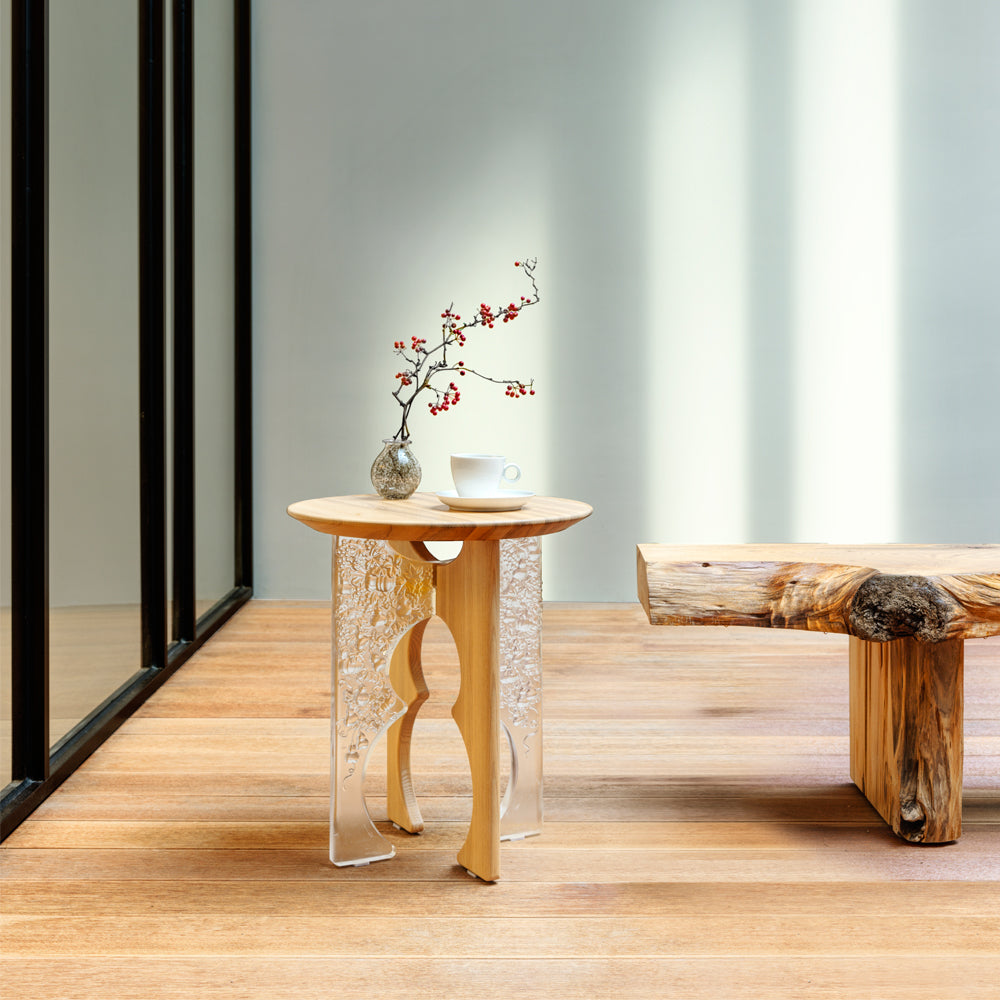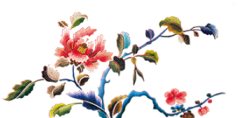Weight Limit and Handling Precautions
·Weight Limit: When the table surface is evenly loaded, the maximum weight limit should not exceed 6 kg (13 lbs)
·Usage Precautions: Please ensure even application and distribution of weight. Avoid placing heavy objects on the edge of the table to prevent imbalance or damage.
·Prohibited Actions: Do not sit on the table surface or apply concentrated force in a single spot, as this may cause the table to tip or become damaged.
·When moving the table, place it down gently to avoid collisions or dragging. During use, avoid sharp objects or concentrated impacts on the surface to prevent cracks or scratches.
·Placing Hot Food: When placing hot food, use heat-resistant pads to avoid sudden temperature changes that could cause the glass to crack.
·Damage Handling: If the table develops cracks, damage, or chipped edges, it increases the risk of glass breakage. Please contact LIULI customer service or the original gallery for an assessment of repair time and costs.
·Warranty Information: Under normal household residential indoor use, this coffee table comes with a one-year warranty, provided there is no damage due to external forces, human factors, or environmental causes.
Glass Cleaning and Maintenance
·For regular cleaning, use a soft electrostatic dust cloth to gently remove dust. If the dust is thicker, use a slightly damp soft cloth to wipe the surface, then dry it with a soft, dry cloth. Avoid wiping dust particles directly with a hard cloth, as this may cause fine scratches.
·If tea, coffee, or other substances stain the glass and watermarks remain after wiping, a microfiber cloth is recommended for cleaning.
·Scratches from prolonged use of the furniture are inevitable. Unless there are cracks or severe damage that affect the safety of the table, we recommend continuing regular use. If you wish to refurbish it after many years, please contact LIULI for an evaluation of the time and cost required for surface polishing.
Wood Cleaning and Maintenance
·Avoid placing the furniture outdoors, in direct sunlight, or in damp areas to prevent deformation and fading of the natural wood due to extreme changes in humidity.
·When placing hot food, use hot pads, tablecloths, or glass to protect the wooden surface from heat and oil damage.
·For regular cleaning, gently remove dust with an electrostatic dust cloth. If dust is heavy, use a slightly damp soft cloth to wipe the surface
dust gently, then dry with a soft, dry cloth. Avoid using hard cloths directly on dust particles, which may cause fine scratches.
·For stains, use a neutral detergent or a baking soda solution to clean, then dry with a soft cloth. Most food colors, such as soy sauce, red wine, and coffee, will not leave marks if cleaned promptly.
·Use a dry cloth with a small amount of wood polish to lightly wipe the furniture surface, maintaining it about once every six months.
·Avoid using volatile cleaners to prevent damage to the surface coating.
·Avoid using cleaners or polishes containing silicone, as they can clog the wood's pores and affect its texture.
Packaging & Unboxing
·The internal packaging of the cardboard box is as shown in the diagram. Please ensure that when the box is not opened, the side with the pattern should be facing upwards.
·Please open the cardboard box from the top and remove all layers of EPE shockproof boards and air cushion packaging.
· To ensure the product’s safety during shipping, the table is placed upside down inside of the box. When handling them, please grip the glass table legs and lift upwards. Once lifted, turns the tabletop side’s up and place it down gently.
· We recommend having two people to unbox the item to prevent breakage when removing it from the packaging. If you notice any loosening between the glass tabletop and the legs during the unboxing process, please contact our customers’ service.
·Please take care to avoid allowing the glass table edge to collide with hard objects when placing the table.
FAQ
Q1: What is the difference between upcycling and recycling?
Upcycling involves taking used materials and enhancing their quality and value to create a product of higher artistic or environmental value than the
original. Recycling, on the other hand, involves breaking down waste materials to create new products, often of the same or lesser quality. Upcycling not only reduces waste but also adds a creative twist, transforming the discarded into something unique and valuable.
Q2: Why is glass considered a suitable material for upcycling, and what is its significance?
Glass is an ideal material for upcycling due to its durability and versatility. It can be melted and reshaped multiple times without losing clarity or purity, making it perfect for creating high-quality, artistic products from discarded pieces. Upcycling glass not only reduces the environmental impact of waste but also provides a medium through which artists can express creativity and innovation. Each upcycled glass piece carries its own unique history and contributes to a sustainable lifestyle, promoting environmental consciousness and the appreciation of artisan crafts.
Q3: Why Choose a Liuli Coffee Table?
As the world focuses on environmental sustainability, driven by our core value of "creating art for the good of the heart (spirit)," LIULI Crystal Art formally initiated the ESG program in 2022. Artist Loretta H. Yang challenged herself to overturn the "Liuli lost-wax casting method" she researched and revived 37 years ago, rethinking the craft process and incorporating "green design" to discover more beautiful color innovations. The residual "sprue" from Liuli artworks is developed for "circular upcycling" possibilities.
Green Design Phase One, themed "One Universe" upcycles "sprue Liuli" into furniture creations, collaborating with Yongjin Wood, a company with over 70 years of history in Taiwan, to start a crossover cooperation producing a series of "tables with concepts of time and space."
Q4: Why a Table?
Returning to the foundational values of LIULI
LIVING, which introduces Eastern aesthetics into daily life, our brand vision:
LIULI LIVING continues the creative essence of LIULI Crystal Art, delving into
the everyday aspects of life—food, clothing, residence, and travel—based on the
beautiful traditional aesthetics of the East, proposing creative living ideas
and presenting a contemporary Chinese cultural lifestyle.
Q5: How is the table made?
The challenge in designing a coffee table lies in showcasing the translucent qualities of liuli (crystal glass) without its inherent transparency being obstructed by the combination with wood, as it is a piece of
furniture. Therefore, we aim to make the liuli float, allowing light to pass through. After numerous trials, we decided to connect the liuli and wood using the traditional mortise and tenon structure. The wood serves as the mortise (concave slot), and the liuli acts as the tenon (convex latch). The connection is achieved using a rotating locking mechanism,
making the liuli elegantly float above the wooden table legs.
Q6: Each Table is Uniquely Made?
Each coffee table is engraved with the manufacturing year and serial
number of LIULI LIVING and comes with a certificate of authenticity.
Earth and Robot are designed by artist Loretta Yang and bear her signature. These are the first ESG coffee table creations that blend design, art, and functionality. Compared to other works by Loretta Yang, these coffee tables are priced much lower, encouraging collectors to actually use them.
The 199lbs (76 kg) Earth table requires the firing of dozens, if
not hundreds, of casting materials, representing a piece composed of hundreds
of liuli art pieces. These casting materials, each with different colors, sintering conditions, and expansion coefficients, are reconfigured and remelted with precise calculations and temperature control. The casting process alone takes a month in the kiln.
Sustainability has no limited edition. Each table is handcrafted and showcases its unique color expression,
making every table one-of-a-kind and impossible to duplicate.
Q7: Is there a warranty period? How to handle damages?
Liuli Gongfang
provides a one-year warranty from the date of purchase. The coffee tables are intended for normal use in domestic indoor household settings, not commercial spaces use.
The warranty mainly covers rare issues such as structural
weakness, wobbling, material degradation, and adhesive failures. Since the
tables are made of solid wood, the need for repairs is typically very low with proper use. Most damages, such as fractures, wear and tear, or changes in
surface color due to external factors (e.g., heat or liquid spills), are usually due to misuse and are not covered by the warranty.
If there are issues like uneven coating, paint drips, color
discrepancies, disliked wood grain, or rough sanding that causes discomfort, customers can request a replacement at the time of acceptance.
Damages caused by improper use or force majeure events (e.g., floods, wind damage, earthquakes, or other natural or human-induced disasters) are not covered under the warranty. In such cases, Liuli Gongfang will assess the actual damage and charge for repair or maintenance materials and labor.
Q8: How to proceed with returns or exchanges if the product has defects?
For in-store purchases, gallery team will assist customers in inspecting the product's
appearance and structure for any abnormalities. If a return or exchange is desired post-purchase, the process follows the same procedure as for regular
Liuli products.
Q9: Can the tables be customized based on needs (size/color)?
Each style is available in two color schemes.
All tables will only be made to order when there is no inventory, following the same procedure as other Liuli Gongfang products.
Customization of wood size is not available.
Q10: What's in the Packaging?
Inside the cardboard box, there
will be an unboxing instruction sheet to remind customers of precautions when removing the table. All five coffee table models come with a certificate of authenticity.
Q11: Have the coffee tables passed safety certifications and inspections?
The wood materials used for the coffee tables are made of ash or beech solid wood, sourced from countries such as North America, New Zealand, and Australia, and meet the EU E1 standards. The wood processing is entrusted to Yongjin Woodworking Factory, which regularly sends samples to SGS for testing
even after the panel processing. The formaldehyde content complies with
Taiwan's national standards (CNS) levels F1 to F3, ensuring safe use.



